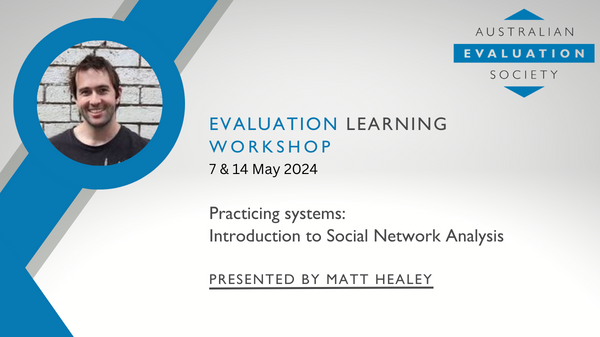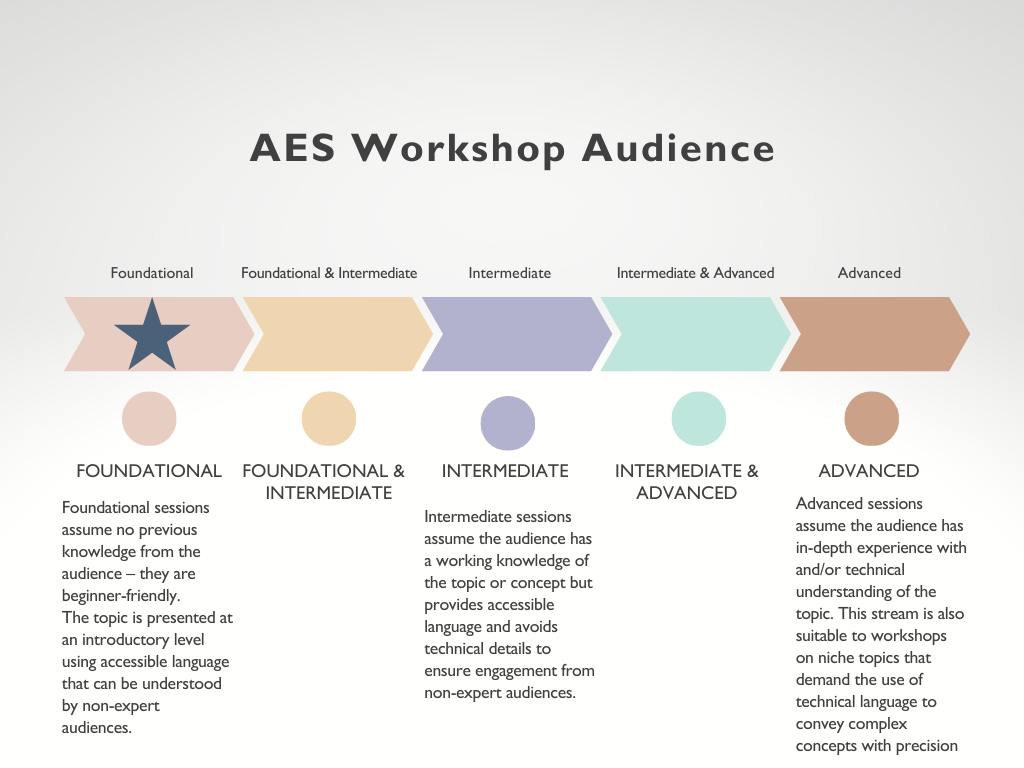Workshop: Practicing systems: Introduction to Social Network Analysis (Online 7 & 14 May 2024)

Workshop: Practicing systems: Introduction to Social Network Analysis
Date and time: Tuesday 7 May and Tuesday 14 May 2024, 9.30am to 12.30pm AEST (registration from 9.15am) Registrants are to attend both sessions. (full day workshop - 2 sessions)
Venue: Via Zoom. Details will be emailed to registrants just prior to the workshop start time
Facilitator: Matt Healey
Register online by: Monday 6 May 2024. Spaces limited to 25 participants
Fees (GST inclusive): Members $295, Organisational member staff $415, Non-members $485, Student member $140, Student non-member $226. Students must send proof of their full-time student status to
Workshop Overview
Systems practices (broadly defined as the suite of methods to understand complex systems) are moving increasingly into the spotlight. As evaluators, or those with a stake in evaluation, we are increasingly tasked with adopting newer or novel methodologies to supplement the core skills we possess.
Social network analysis (SNA) is one such systems practice. It is an approach to capturing and visualising the structure and interactions of the networks and connections that exist between individuals, groups and organisations. Focused on the social elements that operate within a network (e.g. information flows), it provides the framework for visualising complex and dynamic interplays between different stakeholders. Network analysis can reveal features and insights of networks that are otherwise difficult to see, and importantly can be used in a variety of ways including engagement, communications, workshops and evaluation.
Network analysis can be applied in any context that involves different actors or stakeholders – whether it’s about understanding partnerships among grant recipients, who communities trust and access information from during emergencies or identifying the key influencers or brokers in an organisation.
This workshop will introduce SNA as an evaluative technique, the theory that underpins SNA and the ways it is implemented. The focus is on practical application – you will walk away with the knowledge and skills to design and undertake your own network analysis in an evaluation context.
This is an introductory level workshop with no prior knowledge needed. The skills learned here will be useful for a range of responsibilities - from evaluation or program design through to stakeholder engagement. You will have access to materials and cloud-based platforms through which activities will be completed.
Workshop Content
The workshop is divided into four topics (two per session). The first session will focus on the fundamentals of SNA – some of the theory and requirements to scope SNA, and a practical exercise to introduce the basic concepts of ‘doing’ SNA. The second session will be a deep dive into the process and cover the set-up, collection, analysis, visualisation and communication of SNA.
This workshop is designed to be highly practical, with participants walked through each stage of the SNA process. Participants will be provided with a sample data set to use as part of the workshop.
Workshop Outcomes
By the end of the workshop, you will be able to:
-
understand the role and value SNA can play as part of your evaluation toolkit
-
critically assess whether SNA is appropriate in different contexts
-
design and implement data collection
-
understand different types of analysis
-
interpret results and network maps
-
explore the ways in which SNA results can be used and communicated to stakeholders
PL competencies
This workshop aligns with competencies in the AES Evaluator’s Professional Learning Competency Framework. The identified domains are:
-
Domain 4 – Research methods and systematic inquiry
-
Domain 5 – Project management
Who should attend?
Those interested in understanding more about the different systems mapping methodologies that exist, with a particular application to evaluation, program design and stakeholder engagement. This is an introductory level workshop with no prior knowledge of systems practices needed.

Workshop start times
-
VIC, NSW, ACT, TAS, QLD: 9.30am
-
SA, NT: 9.00am
-
WA: 7.30am
-
New Zealand: 11.30am
-
For other time zones please go to https://www.timeanddate.com/worldclock/converter.html
About the facilitator
Matt Healey is a Consultant and Co-Founder at First Person Consulting (FPC). Since 2014, Matt has worked on research, evaluation and design projects that span health, social and environmental content areas with clients of all types. Matt’s passion is the exploration of different approaches and tools used in other industries, and how they might be applied in evaluation and design contexts. His latest interest is all things ‘systems’ and what this means for addressing the sorts of needs and problems that we tackle.
Matt has used SNA and other systems methods in a range of projects. This includes partnership mapping and evaluation in public health, exploring barriers and enablers to the repair of household electrical equipment for the circular economy, and design opportunities to improve student physical activity in secondary schools.
Matt has a reputation as an enthusiastic and adaptable consultant and facilitator, known for consistently producing and providing products and services that are both engaging and useful. Matt has delivered both in-person and online training in a range of contexts, including a 50-person evaluation capability building program for the Victorian State Government.
Event Information
| Event Date | 07 May 2024 9:30am |
| Event End Date | 14 May 2024 12:30pm |
| Cut Off Date | 06 May 2024 6:00pm |
| Location | Zoom |
| Categories | Online Workshops |
We acknowledge the Australian Aboriginal and Torres Strait Islander peoples of this nation. We acknowledge the Traditional Custodians of the lands in which we conduct our business. We pay our respects to ancestors and Elders, past and present. We are committed to honouring Australian Aboriginal and Torres Strait Islander peoples’ unique cultural and spiritual relationships to the land, waters and seas and their rich contribution to society.
